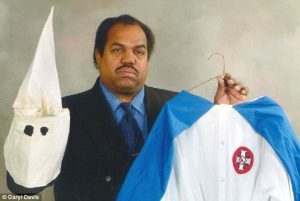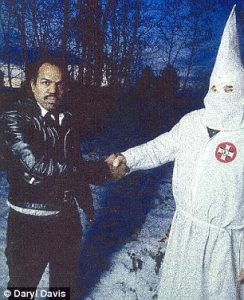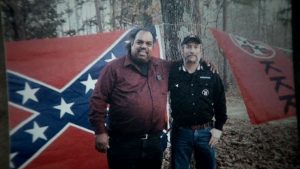 By Rick Hutchins
By Rick Hutchins
To those who took part in the social revolution of nearly half a century ago, the 21st century was expected to be a time of Utopian ideals. Instead, the world has entered a Dark Age of growing extremism, in which hate-mongering and race-baiting have replaced efforts to promote positive change. Instead of leaving the world a better place than they found it, the aging architects of that revolution have had to watch their accomplishments undermined and eroded.
This has led to an atmosphere of despair. Many wonder how we can come back from a culture war in which every day brings escalated rhetoric and the threat of increasing violence.
The answer, of course, is the same as it has always been. The only way to win a war of ideas is to win the hearts and minds of the people. And the only way to truly win hearts and minds is to be right.
For several decades now, a man named Daryl Davis has been doing just that, in a manner that is as unlikely as it is courageous. Davis, who holds a  bachelor’s degree in music and who has performed with artists such as Chuck Berry and Jerry Lee Lewis (to say nothing of his own band), is a Black man who was a child during the Civil Rights Era. He experienced firsthand the harsh reality of that struggle when he became the first Black member of a local Cub Scout troop in Massachusetts. But his innate intellectual curiosity combined with his benevolent disposition to form a most unique reaction to the problem of racism.
bachelor’s degree in music and who has performed with artists such as Chuck Berry and Jerry Lee Lewis (to say nothing of his own band), is a Black man who was a child during the Civil Rights Era. He experienced firsthand the harsh reality of that struggle when he became the first Black member of a local Cub Scout troop in Massachusetts. But his innate intellectual curiosity combined with his benevolent disposition to form a most unique reaction to the problem of racism.
It was in 1983 that Davis met a member of the Ku Klux Klan for the first time, in a bar in Maryland where Davis was performing. This proved to be an educational experience for both men. For the Klansman, because he had never known a Black man before and so was suddenly seeing one as a human being. And for Davis because he finally found the answer to the question of how someone could hate him without knowing him — it was because they didn’t know him.
The friendship that resulted from this encounter not only turned this Klansman away from the Klan, but showed Daryl Davis his path forward.
Over the course of the years that followed, demonstrating patience and tolerance that can only be described as superhuman, Davis met many more Klansmen, by arranging introductions, setting up interviews, and even getting himself invited to Klan meetings. He believed that most racists hold their beliefs because of misconceptions instilled in them in their childhoods, and that it is difficult to maintain these prejudices when confronted with an actual person who belies them.
In short, he believed that the cure for ignorance is education, that the cure for suspicion is kindness, and that the cure for hatred is friendship. In this, he has been proven correct many times over.
 Davis is currently in possession of more than two dozen KKK robes, given to him by former Klansman who have abandoned their ideology, disarmed by the mere existence of this good-natured peacemaker. Among those who have foresworn White supremacy in favor of a Black friend is Roger Kelly, former Imperial Wizard of the Maryland KKK. Kelly later invited Davis to be his daughter’s godfather.
Davis is currently in possession of more than two dozen KKK robes, given to him by former Klansman who have abandoned their ideology, disarmed by the mere existence of this good-natured peacemaker. Among those who have foresworn White supremacy in favor of a Black friend is Roger Kelly, former Imperial Wizard of the Maryland KKK. Kelly later invited Davis to be his daughter’s godfather.
Unbelievably, or perhaps not given the current political climate, Davis has been on the receiving end of criticism from some who self-identify as Progressives, including some members of Black Lives Matter and the NAACP. He has been called an Uncle Tom, and worse, and his achievements have been minimized and trivialized. After all, say his detractors, what difference does it make that in thirty years one man has softened only a smattering of hearts, has changed only a handful of minds?
But what if everyone was like Daryl Davis?
– – – – – – – – – –
Rick Hutchins was born in Boston, MA, and has been an avid admirer of heroism since the groovy 60s. In his quest to live up to the heroic ideal of helping people, he has worked in the health care field for the past twenty-five years, in various capacities. He is also the author of Large In Time, a collection of poetry, The RH Factor, a collection of short stories, and is the creator of Trunkards. Links to galleries of his art, photography and animation can be found on http://www.RJDiogenes.com.
Hutchins is a regular contributor to this blog. Two of his published essays, on astronaut and scientist Mae Jemison and the Fantastic Four’s Reed Richards, can be found in our book Heroic Leadership.
© 2017 Rick Hutchins